Artificial Intelligence Adoption in the Workplace and Its Impact on the Upskilling and Reskilling Strategies
Artificial Intelligence Adoption in the Workplace and Its Impact on the Upskilling and Reskilling Strategies
Author(s): Constanţa-Nicoleta Bodea, Mario Paparic, Radu Ioan MOGOŞ, Maria-Iuliana DascăluSubject(s): Business Economy / Management
Published by: EDITURA ASE
Keywords: upskilling; reskilling; artificial intelligence; competence; ethnography; talent management;
Summary/Abstract: The technology innovation, especially in the case of artificial intelligence, has significantly transformed the work processes and how they are organised and performed. Even if the adoption of advanced technologies usually leads to a higher work performance, there are risks of negative disruptions in the working systems, such as non-ethical use and social negative effects. The paper presents the results of an ethnographic research conducted by the authors, with the objective to identify the impact of the artificial intelligence adoption in the workplace on the professional knowledge and skills requirements and on the upskilling and reskilling strategies. Three different domains were considered: information technology, education, and scientific research. One relevant conclusion of the research is that knowledge and skills requirements should be studied from multiple perspectives, such as profession dynamics, not only from the technology innovation perspective. The research originality mainly consists in the way in which the concept of the level of upskilling/reskilling importance is defined and applied, based on professional knowledge and skills development requirements. By using the assessed level of upskilling/reskilling importance, strategies and related actions may be defined and undertaken. By substantiating this manner of setting upthe upskilling and reskilling strategies and actions, the research has a theoretical and practical impact in the domain of talent management.
Journal: Amfiteatru Economic
- Issue Year: 26/2024
- Issue No: 65
- Page Range: 126-144
- Page Count: 19
- Language: English

